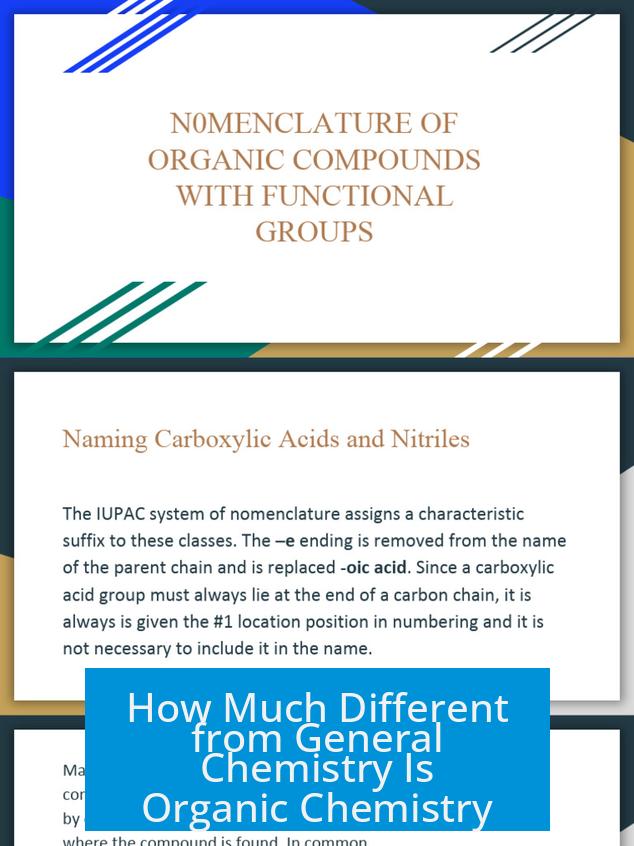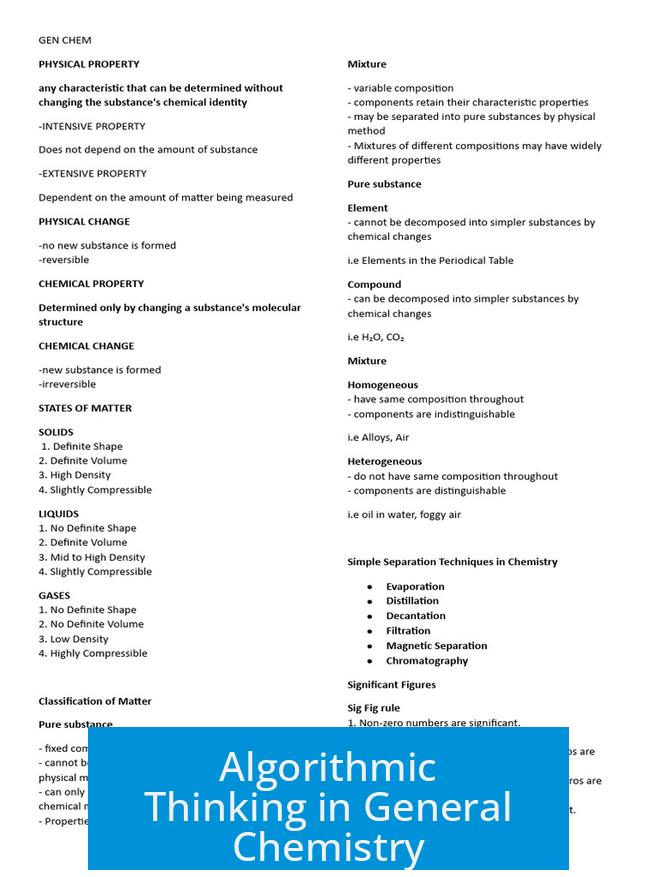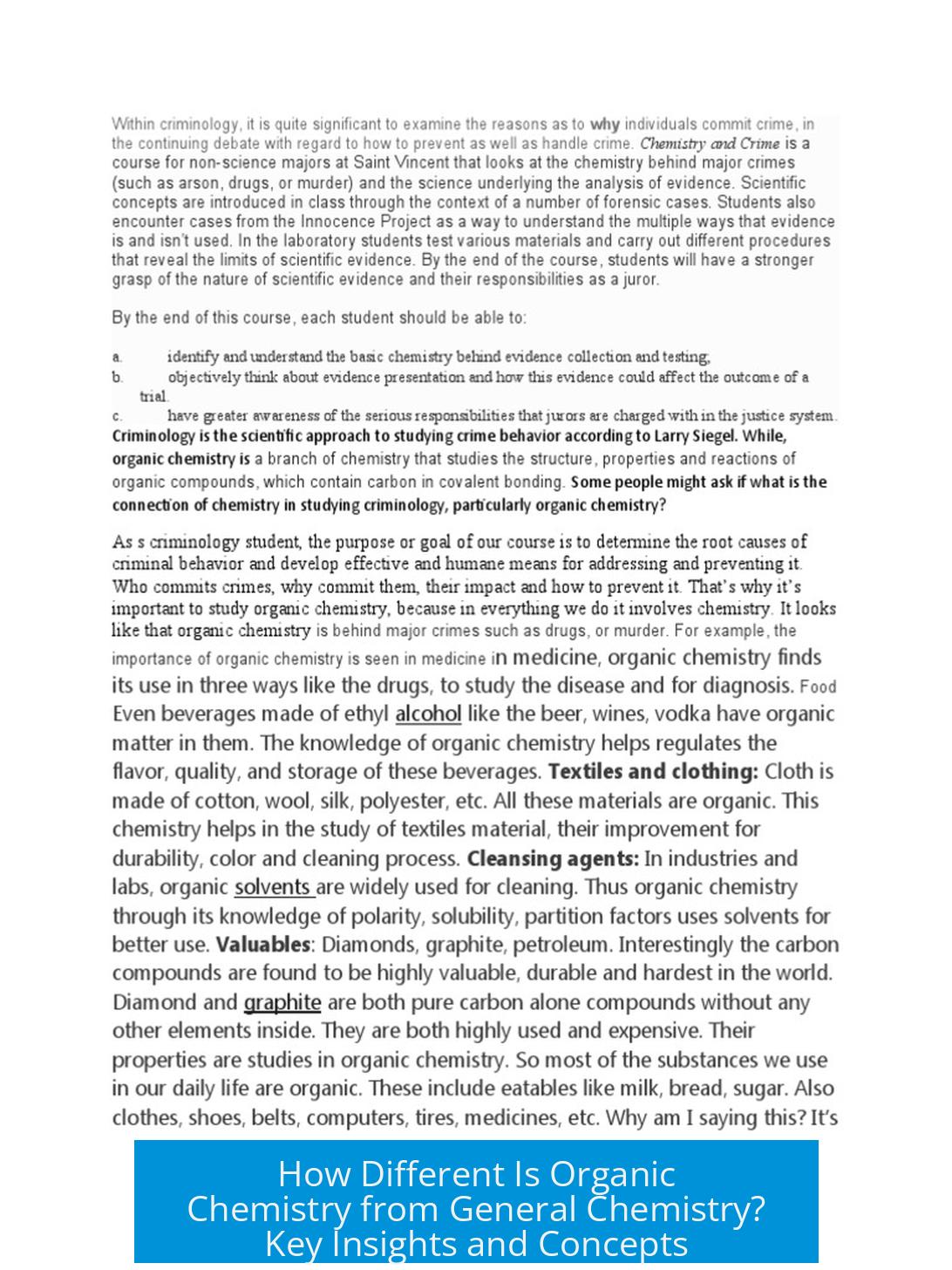How Much Different from General Chemistry Is Organic Chemistry?

Organic chemistry is fundamentally different from general chemistry in both approach and content. While some foundational concepts overlap, organic chemistry requires a new form of thinking that emphasizes spatial visualization and conceptual understanding of molecular behavior, as opposed to the mostly algorithmic processes of general chemistry. This shift in thinking often explains why many students find organic chemistry challenging but highly rewarding once they adapt.
Distinct Nature of Organic Chemistry
Organic chemistry (OChem) is essentially an entirely different subject. It builds on some principles from general chemistry, but many concepts require a different mindset. The two are not just different courses in the curriculum; they demand different cognitive approaches and study techniques.
Where general chemistry emphasizes formulas, numbers, and calculative problem-solving, organic chemistry centers around understanding molecular structures, their interactions, and transformations. In essence, OChem introduces a complex language of molecules, reactions, and mechanisms that go beyond mere numbers.
Algorithmic Thinking in General Chemistry

General chemistry leans heavily on algorithmic thinking. This means that given known formulas, students can apply a fixed set of rules to compute answers. For example, calculating molarities, balancing chemical equations, or determining reaction yields follows predictable steps.
- High school and university general chemistry problems often allow for straightforward application of formulas.
- Students learn set patterns: input data, process via equations, output answers.
- This structured approach suits learners who excel at step-by-step calculations.
Because of this algorithmic nature, mastery often comes down to memorizing formulas and practicing their application repeatedly.
Artistic and Spatial Thinking in Organic Chemistry
In contrast, organic chemistry demands artistic, three-dimensional thinking. Molecules exist in three-dimensional space, yet students represent them as two-dimensional drawings or models. This requires mental rotation and spatial manipulation skills.
Key skills include:
- Visualizing molecular geometry and conformations.
- Predicting interactions based on electronic distributions.
- Following mechanisms through the movement of electrons.
- Considering stereochemistry and chirality in reactions.
Organic chemistry challenges students to “see” how molecules react and change. This visual and conceptual reasoning replaces the algorithmic formulaic approach common in general chemistry.
The Conceptual Shift Needed for Success
This shift from numeric and formula-based problem solving to visual and mechanistic reasoning is significant. It explains why many students perceive organic chemistry as harder. The difficulty lies not in the complexity of fact but in the change required to the thinking process.
Students who accept this new mode of thinking and develop spatial skills usually find organic chemistry manageable. Those who attempt to rely solely on memorization and algorithmic approaches tend to struggle and feel overwhelmed by extensive reaction schemes.
Embracing organic chemistry means:
- Understanding reaction mechanisms deeply rather than memorizing isolated facts.
- Viewing molecules as manipulable 3D objects, not just flat structures.
- Tracking electron flow from nucleophiles to electrophiles through mechanisms.
- Adapting to thinking about reactivity in terms of molecular orbitals and electronic density.
Organic Chemistry as Its Own Language
Organic chemistry has its own terminology, notation, and system of reasoning. Although some general chemistry concepts, like VSEPR theory, apply to understanding molecular shapes, these are only a small overlap.
The rules for reaction patterns, the use of curved arrows to show electron movement, and the stereochemical considerations often feel like learning a new language. Mastery requires immersion and active practice beyond the scope of general chemistry knowledge.
Difficulty and Work Ethic
Organic chemistry is widely considered one of the toughest undergraduate chemistry courses. However, difficulty varies depending on the student’s approach and work ethic.
Key strategies for succeeding include:
- Regularly working through problems from standard textbooks (e.g., Kline, McMurry).
- Studying consistently instead of cramming.
- Developing a clear visualization skillset for molecules and reactions.
- Not panicking even when faced with many reactions to learn.
Persistent effort pays off considerably. Organic chemistry knowledge is more applicable to advanced chemistry disciplines and professional work than many other introductory courses.
Students who excel in organic chemistry show a strong foundation for success in advanced chemistry fields. It’s often said, if you can handle organic chemistry, you can perform well in nearly any chemistry or biochemistry course.
Summary of Differences between General Chemistry and Organic Chemistry
| Aspect | General Chemistry | Organic Chemistry |
|---|---|---|
| Thinking Style | Algorithmic, formula-based. | Artistic, spatial, mechanistic reasoning. |
| Content Focus | Quantitative calculations, elemental reactions. | Structure, function, reactivity of carbon compounds. |
| Visualization | Limited to basic geometry, mole concepts. | 3D molecular models, electron flow mechanisms. |
| Skill Requirements | Memorization of formulas, practice of calculations. | Spatial visualization, pattern recognition, conceptual understanding. |
| Difficulty Perception | More straightforward, process-oriented. | Requires conceptual shift, often perceived as harder. |
| Prerequisite Concepts | Basic chemistry principles, stoichiometry. | Some gen chem principles like VSEPR; mostly new knowledge. |
Key Takeaways
- Organic chemistry requires a fundamentally different mindset than general chemistry.
- General chemistry relies on algorithmic calculations; organic chemistry demands spatial and conceptual visualization.
- Success in organic chemistry depends on embracing the unique language and mechanisms of carbon compounds.
- Strong work ethic and consistent practice improve mastery and reduce the common perception of difficulty.
- Organic chemistry is foundational and better prepares students for advanced studies and professional applications.
What is the main difference in thinking between general chemistry and organic chemistry?
General chemistry is mostly algorithmic—you follow formulas to get precise answers. Organic chemistry needs you to visualize molecules in three dimensions and understand their reactions at a deeper level.
Why do many students find organic chemistry harder than general chemistry?
Organic chemistry demands a new way of thinking. You must see molecules and reactions artistically, not just memorize facts or use formulas. This shift can be tough if you resist changing your approach.
Do any concepts from general chemistry apply in organic chemistry?
Only a few ideas, like VSEPR theory, carry over. Organic chemistry is almost like learning a new language with different rules focused on molecular structure and reactivity.
How important is work ethic when studying organic chemistry compared to general chemistry?
Work ethic is crucial. Success comes from steady practice and solving many problems. Cramming doesn’t help much in organic chemistry because understanding beats memorization.
Is organic chemistry more valuable or practical than general chemistry?
Yes, organic chemistry offers knowledge you’ll use in advanced classes and real chemistry work. It’s considered one of the most applicable and rewarding chemistry courses.





Leave a Comment